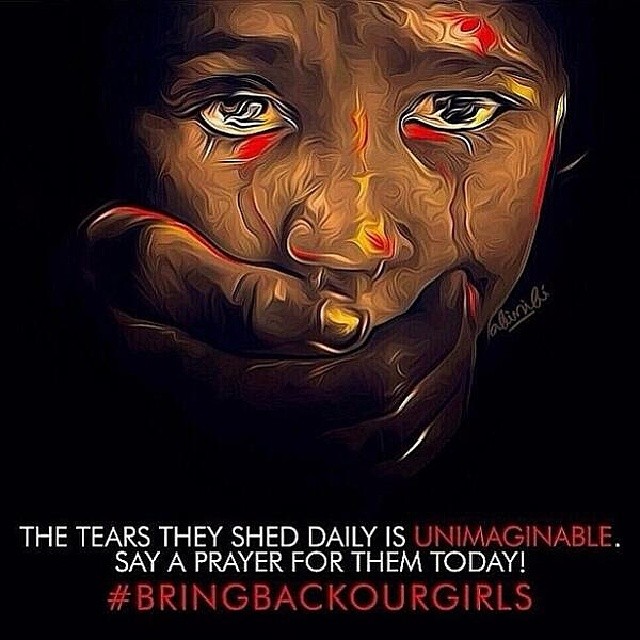“Bring back our girls”
In the dead of night, heavily armed militants made their way to a girls’ boarding school in northeastern Nigeria. The girls were seized by their attackers, who set the school on fire before vanishing. Their kidnappers belonged to an Islamist extremist group called Boko Haram, which translates from the Hausa language to “Western education is a sin.” The armed men took the girls in trucks and then disappeared into the dense forest bordering Cameroon.
Boko Haram opposes the education of women. Its aim is to impose a stricter enforcement of Sharia law across the spilt nation, with a predominantly Muslim North and mainly Christian South. This version of the law states that women should be at home raising children and not being educated, even learning to read and write. To highlight their fundamental philosophy against education Boko Haram targets schools and other places of learning. Constantly on the move to escape a potential government crackdown, the men of Boko Haram leave their wives behind and kidnap girls and women to replace them. The group’s leader, Abubakar Shekau, announced in a video that the kidnappings are part of his latest campaign and were retaliation for Nigerian security forces taking the wives and children of the group members. He states that those kidnapped would begin a new life as servants. In another video released on May 6, Shekau asserted, “I abducted [the] girls. I will sell them in the market, by Allah, there is a market for selling humans. Allah says I should sell. He commands me to sell. I will sell women. I sell women.”
Before being abducted, the girls, aged from 15 to 18, had gone to school to take their final exams despite the risks of seeking education in their area. While they hope to become teachers, doctors, and lawyers, they have now found themselves being auctioned off for $12 each to the militants instead. About 50 girls have escaped, but, according to Nigerian police, about 276 are still missing.
In Chibok, their parents are impatient, accusing military and state authorities of playing politics with the lives and safety of their children. The father of missing 18-year-old, Ayesha, pleads “we are now asking for the world power countries to intervene.” The families of the missing girls have given up on the Nigerian government officials and now look to international pressure in hope to rescue them. “Parents and vigilantes have suspended searches for the kidnapped girls […] and we are not aware of any military rescue operation going on,” stated Chibok resident, Sule. Many residents and families of the kidnapped girls doubt there will be any government or military action to aid their cause.
The mass abduction has been a rallying point for many Nigerians. Several hundred women have marched on the capital, Abuja, demanding the government take more action. Protest leader Hadiza Bala Usman stated, “we are trying to bring the plight of the Chibok girls to the attention of the government, we see the Nigerian government not showing enough concern.” She added that this situation and how the government is handling it “brings to mind a lack of commitment by the army,” who previously announced they rescued the captives, but then issued a retraction. Parents armed with bows and arrows pursued the kidnappers, but turned back when confronted with militants armed with AK-47s. One father said that they are praying to God for the United States and the United Nations to help get their daughters back. Relatives also took to social media to voice their situation, including initiating a Twitter campaign using the hashtag #BringBackOurGirls to demand more action from both the Nigerian government and from outside the state.
The kidnapping has attracted international attention. The Obama administration said that the United States offered intelligence and information to the Nigerian authorities, and it has been “in regular touch with the Nigerian government about what [they] might do to help help support its efforts to find and free these young women.”
The attack in Nigeria is part of a wider backlash against girls’ education by Islamic extremists. Attacks have been reported in Afghanistan, when such extremists threw acid in faces of girls walking to school, as well as in Pakistan where the Taliban shot Malala Yousafzai in the head for advocating girls’ education. Last year alone in Nigeria, militants destroyed 50 schools. The greatest threat to these extremists aren’t drones, but girls going to school.
In an email to New York Times reporter Nicholas Kristof, Yousafzai said, “These abducted schoolgirls are my sisters, and I call on the international community and the government of Nigeria to take action and save my sisters.” The social media campaign gained momentum after Yousafzai posed in a picture with a #BringBackOurGirls poster. Protesters took to the streets on May 4, in front of the Nigerian High Commission of London. The predominantly female crowd chanted and carried banners that said, “These are our sisters.” Crowds also gathered in Los Angeles, carrying posters in reference to the Twitter campaign, #BringBackOurGirls, and in Washington, protesters gathered at the Lincoln Memorial to decry the lack of action taken by the Nigerian government. These small protests and the online campaign have triggered a global call for action. Meanwhile, however, the families wait in agony.
Sources: cnn.com, nytimes.com

On her third year on the Talon, Faria is serving as co-EIC with Michael Borger (God, help us all). As a senior, Faria discovered the key to success–and...









